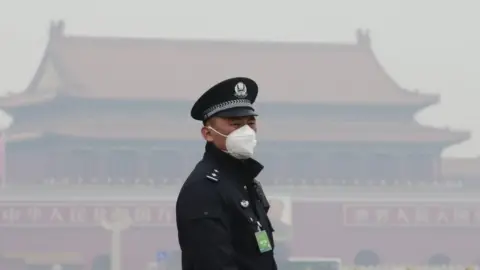China and US pledge climate change commitment
 Reuters
ReutersChina and the US say they are committed to working together and with other countries on tackling climate change.
It comes after several meetings between Chinese climate envoy Xie Zhenhua and his US counterpart John Kerry in Shanghai last week.
They both agreed on further specific actions to reduce emissions, a joint statement on Sunday confirmed.
US President Joe Biden is holding a virtual climate summit this week, which China says it is looking forward to.
However it is not yet known if Chinese President Xi Jinping will join the world leaders who have pledged to attend.
"The United States and China are committed to cooperating with each other and with other countries to tackle the climate crisis, which must be addressed with the seriousness and urgency that it demands," the statement said.
It added that both nations will continue to discuss "concrete actions in the 2020s to reduce emissions aimed at keeping the Paris Agreement-aligned temperature limit within reach".
Both nations also agreed to help developing countries finance a switch to low-carbon energy.
Li Shuo, senior climate adviser for environmental group Greenpeace, described the statement as "positive".
"It sends a very unequivocal message that on this particular issue (China and the United States) will co-operate. Before the meetings in Shanghai this was not a message that we could assume, " Mr Li told Reuters news agency.


The joint statement - issued symbolically at a round table - will relieve anyone concerned about the planet. It simply won't be possible to stabilise climate change unless the superpower super-polluters pull much harder. A recent report said China, for instance, must close down 588 coal-fired power plants to meet its climate pledges.
Is China heading in the right direction on coal? No - its regional governors have been building even more coal plants to stimulate the economy.
One outcome from the US-China meeting is the acknowledgement that finance flows should be channelled to low-carbon projects, not high carbon. Both sides have also promised plans for reducing their own emissions further. President Biden will unveil his proposals at or before the US summit this coming week.
President Xi is playing coy over whether he'll attend the summit. Instead he may announce tighter Chinese targets at the Boao Forum - a Chinese forum for business and government leaders - also this week. And don't forget: all other nations need to commit to tackling the climate - not just the superpowers.

Mr Kerry's trip to China is the first high-level visit by a member of the Biden administration since the new US president took office. However US and Chinese officials met for talks in Alaska last month.
Ahead of his trip to Shanghai, Mr Kerry told CNN that China's co-operation was "absolutely critical" to battle the climate crisis.
"Yes, we have big disagreements with China on some key issues, absolutely. But climate has to stand alone," he said.
What needs to change?
Climate scientists warn that global warming must not rise more than 2C above pre-industrial levels - in fact the aim should be well below this with an increasingly ambitious 1.5C goal, to avoid the worst of climate breakdown.
Central to the Paris Agreement are nationally determined contributions (NDCs). These are targets intended to cut emissions.
NDCs represent the commitments by each country - under the Paris pact - to reduce their own national emissions and adapt to the impacts of climate change.
According to the Climate Action Tracker, an independent scientific analysis that tracks government climate action, China's NDC rating is "highly insufficient" and "are not at all consistent with holding warming to below 2C".
China has pledged to peak its emissions by 2030, and achieve carbon neutrality by 2060 (that means cutting out all carbon emissions from fossil fuels but still allowing farm emissions of methane - another planet-heating gas).
However, China is currently running 1,058 coal plants - more than half the world's capacity.
The US, meanwhile, has the worst NDC rating of "critically insufficient" on the Climate Action Tracker.
The US was absent from climate negotiations during President Donald Trump's term of office and it is now being urged to cut emissions to between 57% and 63% below 2005 levels this decade.
